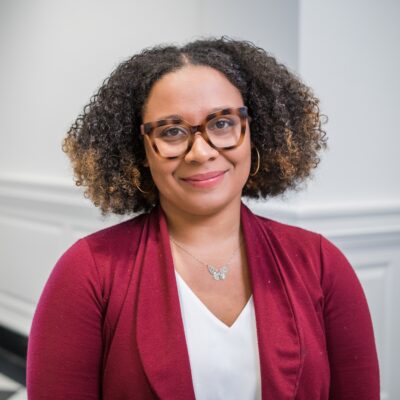Student Spotlight: Andrea Robinson

April 28, 2025
Andrea Robinson is a doctoral candidate in nutrition from Dallas, Texas. She earned a B.S. in kinesiology and allied health at the University of North Texas and now studies the impact of improved maternal and child nutrition on child health outcomes under the guidance of Saurabh Mehta at Cornell.
What is your area of research and why is it important?
My research examines how improving maternal and child nutrition can improve child health outcomes, specifically child undernutrition. The first 1,000 days of life, from conception until the child’s second birthday, are crucial for building the foundations of proper infant growth and development, which will have lasting effects throughout the child’s life. A child’s health is directly and intricately linked with the health status of its mother; thus, improving child health outcomes start with understanding and improving maternal malnutrition.
What are the larger implications of this research?
Maternal and child undernutrition is a growing public health concern, particularly in low- and middle-income countries (LMICs). As of 2022, there are still more than 20% of children worldwide who are affected by stunting, the main indicator of undernutrition. The consequences of undernutrition extend beyond childhood, increasing mortality rates, susceptibility to infections, and impairing cognitive and physical development. In adulthood, early-life malnutrition contributes to reduced work capacity, lower economic productivity, and heightened risks of chronic diseases. Thus, it is imperative that research focuses on creating and developing interventions and policies aimed to improve maternal and child nutrition.
What does it mean to you to be a Bouchet Scholar?
To me being an Edward Bouchet Scholar is a great honor that serves as recognition of the work I have done while at Cornell. It means that I continue a legacy that exemplifies CLASS (character, leadership, advocacy, service and scholarship), which started with Dr. Edward Bouchet, the first Black American to get a Ph.D. from an American university. Dr. Bouchet is one of the many Black Americans who laid the foundation for which I stand and draw inspiration. It has been and will always be my duty to follow in the footsteps of my ancestors while continuing to carve a path forward for those coming after me. Being a member of the Edward A. Bouchet Honor Society in honor of Dr. Bouchet is one I hold in high esteem.
How do you exemplify the five pillars of the Bouchet Society—character, leadership, advocacy, scholarship, and service?
Despite being born to a teenage mother with little formal education, my mother instilled a great sense of pride in me about being a servant-leader, an advocate, and receiving an education. Thus, the characteristics and thrust of the Bouchet Honor Society are engraved in my DNA. My earliest memories of advocacy and scholarship occurred in high school when I was overlooked to be a part of AVID, a program designed for first-generation, low-income college students. My mom and I advocated for my inclusion in AVID, upon graduation I became the first recipient of the school district’s AVID scholarship. At Cornell, I served as the treasurer of the Black Graduate and Professional Student Association, the high school programs graduate coordinator, and currently a McNair graduate coordinator.
What are your hobbies or interests outside of your research or scholarship?
Outside of research, I enjoy hanging with family, friends, and my fur babies, Nike and Puma. I also enjoy traveling and trying new foods. Recently, I have become a self-taught crocheter and baker.
Why did you choose Cornell to pursue your degree?
I was recruited to Cornell by Dr. Margaret Bynoe. She recognized my potential as a graduate student at Cornell before I did. However, after visiting I knew Cornell was where I would go to graduate school. The staff, students, and faculty I interacted with were highly intelligent, kind, and personable. Additionally, the flexibility offered by my degree program was awesome.
